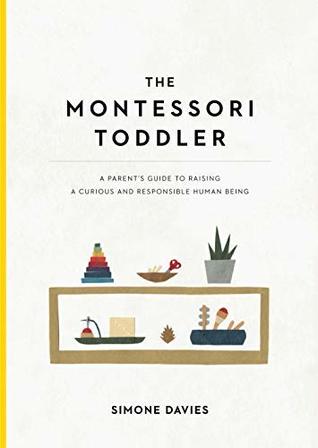More on this book
Community
Kindle Notes & Highlights
Read between
March 9 - April 5, 2022
Montessori activities for toddlers fall into five main areas: 1. eye-hand coordination 2. music and movement 3. practical life (activities of daily life) 4. arts and crafts 5. language
Part One Encouraging curiosity in our child Five ingredients for curiosity 1. Trust in the child 2. A rich learning environment 3. Time 4. A safe and secure base 5. Fostering a sense of wonder Seven principles for curious humans 1. Follow the child 2. Encourage hands-on learning 3. Include the child in daily life 4. Go slow 5. Help me to help myself 6. Encourage creativity 7. Observation
With a foundation of the five basic ingredients, we can apply seven principles to help them become curious human beings. 1. Follow the child—let them lead. 2. Encourage hands-on learning—let them explore. 3. Include the child in daily life—let them be included. 4. Go slow—let them set their own pace. 5. Help me to help myself—let them be independent and responsible. 6. Encourage creativity—let them wonder. 7. Observe—let them show us.
As the adult, we often need to act as our toddler’s prefrontal cortex (the rational part of their brain), which is still developing. We can step in to keep them safe. To keep others safe. To keep ourselves safe. To show them they can disagree with others in a respectful way. To show them how to show up and be responsible human beings.
Alfie Kohn wrote a useful article, “Five Reasons to Stop Saying ‘Good Job!’” in which he points out that: • Praise can actually be used to manipulate children when we use it as a bargaining tool to motivate them. • It can create praise junkies. • Praise can actually take the joy away, with children looking to us for reassurance rather than experiencing delight at what they have achieved. • Children can become less motivated when they do something for praise, because it removes the meaning for themselves. • Praise can lower achievement—when an activity is tied to the pressure to perform, the
...more
Montessori teachers believe instead that a child will learn to behave if we help to develop their intrinsic motivation—their internal radar that tells them that something is right (or wrong) and recognizes what helps (or hurts) themselves or someone else.
Allowing our child to be curious and giving them a sense of significance, belonging, and acceptance provides a solid foundation of connection and trust with our child—something we will need to cultivate cooperation and when we have to set limits with them. Without connection, we get very little cooperation; without trust, setting limits becomes difficult.
Cultivating cooperation involves: • problem solving with our toddler • involving the child • talking in a way that helps them listen • managing our expectations • a little bonus
IDEAS FOR CULTIVATING COOPERATION Problem solving with our toddler • Ask, “How can we solve the problem?” • Make a checklist. INVOLVE THE CHILD • Give age-appropriate choices. • Give them information. • Use one word. • Get their agreement. TALK IN A WAY THAT HELPS THEM LISTEN • Use positive language. • Speak with a respectful tone and attitude. • Ask them for help. • Say “yes.” • Use humor. • If our child is going through a “no” phase, adjust our language. • Show them. Manage expectations • Have age-appropriate expectations and be prepared. • Try to wait until they have finished before making
...more
The purpose of these first six years is for the child to gain physical and biological independence from their parent. With such enormous changes taking place during this time, it is generally a very volatile period.
Childhood (6 to 12 years): the second plane of development Where the first-plane child was working on physical and biological independence, the second-plane child is working on their mental independence. They are driven to know everything and to explore the reason behind things, no longer simply absorbing the information.
Adolescence (12 to 18 years): the third plane of development
The adolescent period has much in common with the first plane, so for parents who think that toddlers and teenagers are similar, Dr. Montessori would agree. Again this is a period of enormous physical and psychological change as children move through puberty. And where the infant was becoming physically independent from their parent, the teenager is working on social independence and moving away from their families.
Maturity (18 to 24 years): the fourth plane of development Dr. Montessori said that if everything has been done in the first three planes of development, the fourth plane takes care of itself. She referred to this plane’s work as developing spiritual and moral independence.


